Möchten Sie die Kreativität und Fantasie Ihres Kindes fördern? Suchen Sie nach unterhaltsamen und spannenden Möglichkeiten, Rollenspiele zu fördern? Wie können Rollenspielideen Ihrem Kind helfen, soziale, emotionale und kognitive Fähigkeiten zu entwickeln?
Rollenspiele gehören zu den wirksamsten Mitteln, um die Kreativität kleiner Kinder zu fördern. Sie bieten ihnen die Möglichkeit, neue Rollen zu entdecken, Emotionen auszudrücken und spielerisch ihre Problemlösungsfähigkeiten zu entwickeln. Fantasievolle Szenarien in den Alltag zu integrieren, kann Ihrem Kind helfen, die Welt um sich herum besser zu verstehen.
Im folgenden Artikel zeigen wir Ihnen die vielen Vorteile des Rollenspiels für Kinder auf und bieten kreative Ideen und Tipps zum Schaffen einer abwechslungsreichen und spannenden Umgebung für Kinder.
Was ist Rollenspiel?
Rollenspiele, auch bekannt als Rollenspiele, sind Aktivitäten, bei denen Kinder ihre Fantasie nutzen, um reale oder fiktive Situationen zu simulieren. Dazu gehören beispielsweise das Nachspielen eines Berufs (Arzt, Lehrer, Feuerwehrmann), das Nachahmen sozialer Rollen (Eltern, Geschwister) oder das Erschaffen völlig fiktiver Welten (Superhelden, Piraten, Fantasiewesen). Rollenspiele können Einzel- oder Gruppenaktivitäten mit körperlicher Bewegung, verbalem Ausdruck und Requisiten oder Kostümen sein.
In dramatisches SpielKinder übernehmen oft Rollen und spielen Geschichten oder Erlebnisse nach, die sie gesehen, gehört oder sich vorgestellt haben. Dadurch können sie verschiedene Perspektiven erkunden, Emotionen ausdrücken und soziale Normen und Verhaltensweisen einüben. Wenn Kinder beispielsweise so tun, als wären sie Eltern, ahmen sie möglicherweise Betreuungshandlungen nach, was ihnen hilft, Empathie und Verantwortung zu verstehen.
What are the Types of Dramatic Play?
Dramatic play is generally categorized into two primary types based on how guided or open-ended the experience is: Structured and Unstructured. Both types are essential in early childhood development and offer distinct benefits to a child’s learning journey.
Strukturiertes Rollenspiel
Structured dramatic play refers to adult-guided, theme-specific, or goal-oriented pretend play experiences. In this type of play, children are provided with specific roles, props, rules, or objectives to follow. It is commonly used in classroom settings to meet targeted learning outcomes.
Hauptmerkmale:
- Often aligned with curriculum goals (e.g., a hospital to learn about community helpers).
- Involves adult facilitation or direction.
- May include scripted elements or planned tasks.
- Focuses on specific vocabulary, routines, or skills.
Examples:
- A “Post Office” play setup with labeled envelopes, delivery logs, and assigned roles.
- Reenacting a story like The Three Little Pigs with props and guided dialogue.
- A teacher-led “Restaurant” where children follow a menu, take orders, and practice counting money.
Educational Benefits:
Structured play enhances language acquisition, social routines, role comprehension, and supports cross-curricular learning in subjects like math, science, or social studies.
Unstrukturiertes Rollenspiel
Unstructured dramatic play is child-initiated, spontaneous, and open-ended, allowing children complete freedom to create their own stories, roles, and worlds. This is the most natural and intuitive form of play, especially in home or free-choice classroom environments.
Hauptmerkmale:
- Driven entirely by the child’s imagination and interest.
- Lacks fixed goals, rules, or teacher-imposed scripts.
- Props and materials may be improvised or symbolic.
- Often fluid and adaptable, roles can change at any time.
Examples:
- A child pretending a stick is a magic wand while becoming a wizard in the backyard.
- Siblings are creating a pretend school with stuffed animals as students.
- Free play where costumes, pillows, or boxes become part of a made-up world.
Educational Benefits:
Unstructured play strengthens creativity, problem-solving, emotional expression, and flexible thinking. It encourages independence and allows children to process real-life experiences symbolically.
Vorteile des Rollenspiels
Rollenspielideen sind mehr als nur Spaß; sie sind wichtige Bestandteile der kindlichen Entwicklung. Zu den wichtigsten Vorteilen gehören:
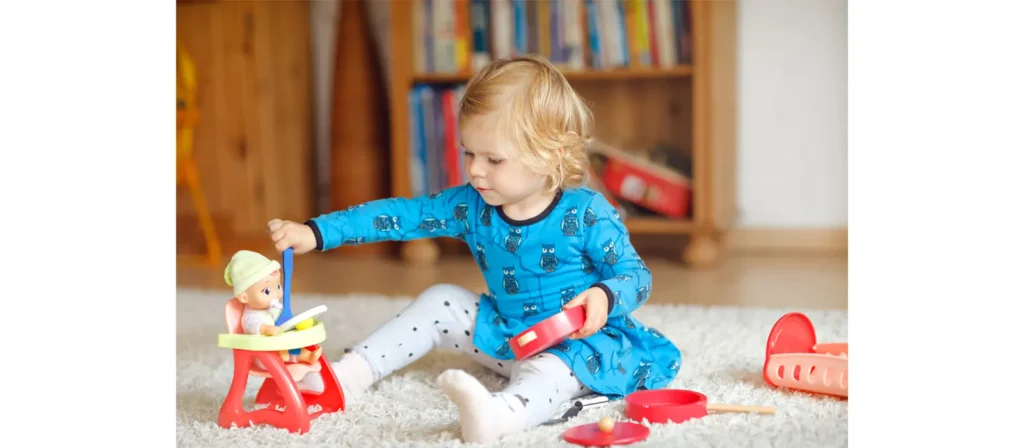
1. Kognitive Entwicklung
- Problemlösungsfähigkeiten: Beim Rollenspiel stoßen Kinder oft auf Probleme, die kreative Lösungen erfordern. Wenn sie beispielsweise so tun, als würden sie ein Restaurant betreiben, müssen sie herausfinden, wie sie Gäste platzieren, Bestellungen aufnehmen und Essen servieren. Dies fördert ihre Fähigkeit, kritisch zu denken und Probleme zu lösen.
- Gedächtnis und ErinnerungRollenspiele sind ein hervorragendes Mittel zur Stärkung des Gedächtnisses. Kinder spielen vertraute Szenarien nach und verwenden dazu Kostüme und Requisiten, um Geschichten oder reale Erlebnisse zu simulieren. So stärken sie ihr Kurz- und Langzeitgedächtnis.
- Abstraktes DenkenRollenspiele in Kindertagesstätten fördern das symbolische Denken. Ein einfacher Stock kann zu einem Schwert werden, eine Kiste zu einem Raumschiff und eine Decke zu einem Umhang. Diese Abstraktion fördert die Entwicklung von Fantasie und Kreativität.
2. Soziale und emotionale Entwicklung
- Empathie und PerspektivübernahmeDurch Rollenspiele versetzen sich Kinder in die Lage anderer. Wenn Kinder beispielsweise im Rollenspiel ihrer Kinder als Eltern oder Lehrer agieren, entwickeln sie ein Verständnis für unterschiedliche Emotionen und Verhaltensweisen. Sie entwickeln Empathie, indem sie sich vorstellen, wie andere sich fühlen und wie sie in verschiedenen sozialen Situationen reagieren.
- Emotionale Regulierung: Rollenspiele beinhalten oft das Ausleben von Emotionen, wie zum Beispiel Angst, Traurigkeit oder Aufregung. Dies bietet Kindern eine gesunde Möglichkeit, ihre Gefühle auszudrücken und hilft ihnen zu verstehen, wie sie ihre Gefühle im wirklichen Leben regulieren können.
- Soziale Kompetenzen: Wenn Kinder an Gruppenrollenspielen teilnehmen, üben sie Kommunikation, Kooperation, Verhandlung und Konfliktlösung. Diese Fähigkeiten sind entscheidend für den Aufbau von Freundschaften und den Umgang mit sozialen Situationen.
3. Sprachentwicklung
- Wortschatzerweiterung: Durch Rollenspiele lernen Kinder neue Wörter und Ausdrücke kennen, insbesondere solche, die mit bestimmten Rollen oder Situationen zusammenhängen, wie „Kunde“, „Bestellung“, „Speisekarte“ oder „Notfall“. Die häufige Verwendung neuer Vokabeln trägt zur Festigung der Sprachkenntnisse bei.
- Geschichtenerzählen und ErzählfähigkeitenRollenspiele helfen Kindern, den Aufbau einer Geschichte mit Anfang, Mitte und Ende zu verstehen. Sie fördern die Kreativität beim Erfinden neuer Szenarien und Erzählungen und verbessern so die Erzählkompetenz.
- Kommunikation: Rollenspielideen fördern den verbalen Ausdruck, da Kinder ihre Gedanken, Ideen und Pläne im Rollenspiel mit Gleichaltrigen kommunizieren müssen. Dies verbessert ihre Fähigkeit, ihre Gedanken zu artikulieren und sinnvolle Gespräche zu führen.
4. Motorische Entwicklung
- Grobmotorische Fähigkeiten: Bei inaktiven Formen des Rollenspiels können Kinder rennen, springen, klettern oder tanzen und dabei ihre großen Muskelgruppen entwickeln.
- Feinmotorik: Der Umgang mit Rollenspielspielzeug wie kleinen Gegenständen, das Anziehen von Rollenspielkostümen oder das Anordnen von Requisiten fördert die Feinmotorik. Diese Aktivitäten verbessern auch die Fingerfertigkeit und die Hand-Augen-Koordination.
So fördern Sie Rollenspiele zu Hause oder im Kindergarten
Für Rollenspiele zu Hause oder im Klassenzimmer ist eine Umgebung erforderlich, die Fantasie und Rollenspiel fördert. Hier sind einige Strategien:

Spielbereiche einrichten
Erstellen Sie ausgewiesene Bereiche Hier können Kinder Rollenspiele spielen. Eine gemütliche Ecke mit Kostümen, Requisiten und themenbezogenen Gegenständen wie Küchenutensilien, Werkzeugen oder Puppen kann die Kreativität anregen. Beispielsweise kann ein Raum mit einem kleinen Tisch und Stühlen, Spielessen und Speisekarten in ein Restaurant verwandelt werden, in dem die Kinder herumlaufen können.
Stellen Sie offene Materialien bereit
Kinder brauchen kein teures Spielzeug, um Rollenspiele zu spielen. Stellen Sie Materialien wie Pappkartons, alte Kleidung, Stoff, Küchenutensilien und unzerbrechliche Haushaltsgegenstände zur Verfügung. Diese Materialien regen Kinder dazu an, ihre Kreativität zu nutzen und eigene Szenarien zu erfinden.
Beispiele für offene Requisiten:
| Alltagsgegenstände | Dramatische Anwendungen |
|---|---|
| Schals | Costumes, capes, picnic blankets, and royalty accessories |
| Kartons | Raumschiffe, Küchen, Schlösser |
| Holzlöffel | Mikrofone, Zauberstäbe, Trommelstöcke |
| Alte Telefone | Wirtschaftsspiel, Arztpraxis, Interviews |
Seien Sie ein Ermutiger, kein Direktor
Obwohl es wichtig ist, dramatisches Spiel zu fördern, sollten Sie es vermeiden, das Spiel zu übernehmen oder zu dirigieren. Kinder sollten ihrer Fantasie freien Lauf lassen können, ohne dass Erwachsene zu sehr eingreifen. Wenn nötig, leiten Sie sie behutsam an, indem Sie offene Fragen stellen und sie zum kreativen Denken anregen, wie zum Beispiel: „Was denkst du, würde der Arzt als Nächstes tun?“ oder „Wie können wir dieses Problem gemeinsam lösen?“
Einfache Themen und Szenarien einführen
Wenn die Kinder beim Einstieg ein wenig Hilfe brauchen, führen Sie einfache, nachvollziehbare Themen ein, wie zum Beispiel:
- Zum Arzt gehen
- Lebensmitteleinkauf
- Betrieb einer Bäckerei
- Den Weltraum erkunden
- Besuch eines Zoos
Diese Themen sind vertraut, lassen sich leicht in Rollenspielen umsetzen und bieten zahlreiche Möglichkeiten zur Sprachentwicklung und Problemlösung.
Modellieren Sie dramatisches Spiel
Erwachsene können Kindern auch Ideen für Rollenspiele vorführen, um ihnen zu zeigen, wie es funktioniert. Indem sie in die Rolle von Figuren schlüpfen oder mit ihnen Rollenspiele spielen, können sie zeigen, wie man neue Ideen ins Spiel einbaut.
Bieten Sie Möglichkeiten zum Gruppenspiel
Rollenspiele können eine individuelle Aktivität sein, sind aber noch bereichernder, wenn Kinder zusammenarbeiten. Fördern Sie Gruppenspiele, indem Sie Spieltreffen oder Klassenaktivitäten organisieren, bei denen Kinder zusammenarbeiten und Rollen teilen können. Dies fördert die soziale Interaktion und die Kommunikationsfähigkeit.
Wechseln Sie die Requisiten, um für Abwechslung zu sorgen
Um Spannung und Neugierde aufrechtzuerhalten, sollten Spielzeuge und Requisiten regelmäßig ausgetauscht werden. Wenn ein Feuerwehrhelm für eine Weile verschwindet und später wieder auftaucht, fühlt er sich plötzlich wieder neu an. Dieser Trick beugt Langeweile vor und belebt das Spiel mit wenig Aufwand.
Feiern Sie den Prozess, nicht das Produkt
Anders als beim Basteln oder Puzzlen geht es beim Rollenspiel um das Erlebnis, nicht um das Ergebnis. Es gibt kein Richtig oder Falsch, etwas vorzutäuschen. Statt sich auf Leistung oder Vollendung zu konzentrieren, sollten Sie Kreativität, Zusammenarbeit und die pure Freude am fantasievollen Spiel feiern.
26 Creative Dramatic Play Ideas
Rollenspiele ermöglichen es Kindern, in verschiedene Rollen zu schlüpfen, ihre Kreativität zu entdecken und praktische Fähigkeiten zu üben. Um die Fantasie anzuregen, werden Kinder einige Rollenspielideen lieben!
1. Pretend Play Kitchen Dramatic Play Ideas
- Verwenden Sie einen kleinen Tisch als Küchentheke, Pappkartons als Herde oder Kühlschränke und Plastikteller und -besteck für imaginäre Mahlzeiten.
- Stellen Sie leere Behälter, Messbecher und Spielzeug-Backutensilien zum Kochen und Backen bereit.
- Fügen Sie Schürzen und Kochmützen für Rollenspiele hinzu, erstellen Sie ein Spielmenü und beschriften Sie verschiedene Bereiche wie „Spüle“ und „Kühlschrank“.
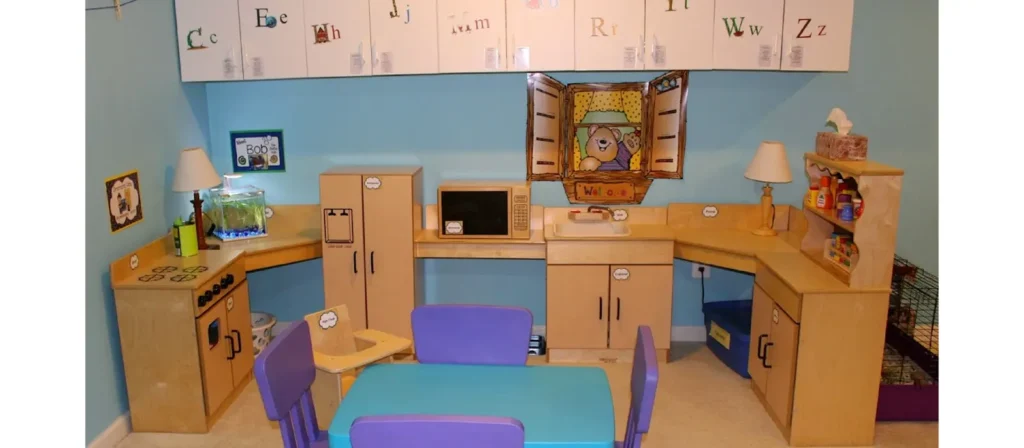
Bildungswert:
Pretend kitchen play enhances cognitive sequencing and symbolic thinking as children plan and prepare imaginary meals. It supports language development by encouraging the use of cooking-related vocabulary and conversational role-play. Fine motor skills are strengthened through the manipulation of utensils, containers, and tools. Additionally, it nurtures social cooperation, responsibility, and turn-taking during collaborative scenarios.
2. Ideen für Rollenspiele im Blumenladen
- Verwenden Sie bunte Kunstblumen, Seidenpapierblumen oder sogar echte Pflanzen. Stellen Sie sie in Vasen oder Körben auf.
- Beschriften Sie die Blumen mit Preisen und gestalten Sie ein Schild mit der Aufschrift „Blumenladen“. So üben Kinder das Lesen und lernen etwas über Geld.
- Stellen Sie Spielzeug-Gartengeräte zur Verfügung, damit Kinder Blumensträuße „arrangieren“ und sie als Geschenke für Kunden verpacken können.
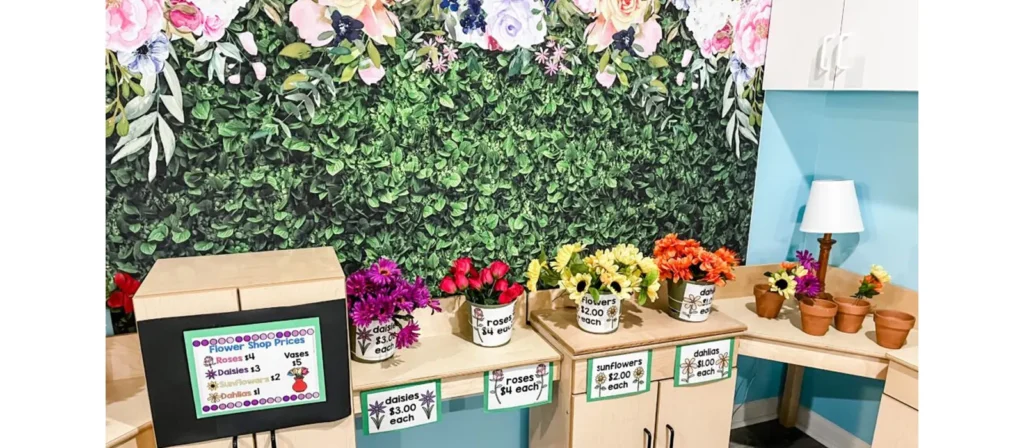
Bildungswert:
This activity fosters creativity, pattern recognition, and basic numeracy through arranging, labeling, and “selling” floral products. Children expand their vocabulary related to colors, flowers, and emotions, while also engaging in social interaction through customer role-play. It introduces early business concepts, such as pricing and transaction exchange, and refines fine motor coordination with hands-on floral work and gift-wrapping tasks.
3. Ideen für Rollenspiele im Weltraum
- Bauen Sie aus Pappkartons oder Decken eine Raumfähre. Kinder können abwechselnd Astronauten, Missionsleiter oder außerirdische Entdecker spielen. Diese Idee fördert die Fantasie, die Problemlösungsfähigkeit und die soziale Interaktion.
- Stellen Sie Kindern „Weltraumausrüstung“ wie Helme, Teleskope und Weltraumkarten zur Verfügung. Sie können auf Missionen gehen, um neue Planeten zu erkunden, außerirdische Spezies kennenzulernen und neue Welten zu entdecken, während sie gleichzeitig etwas über Teamarbeit und Erkundung lernen.
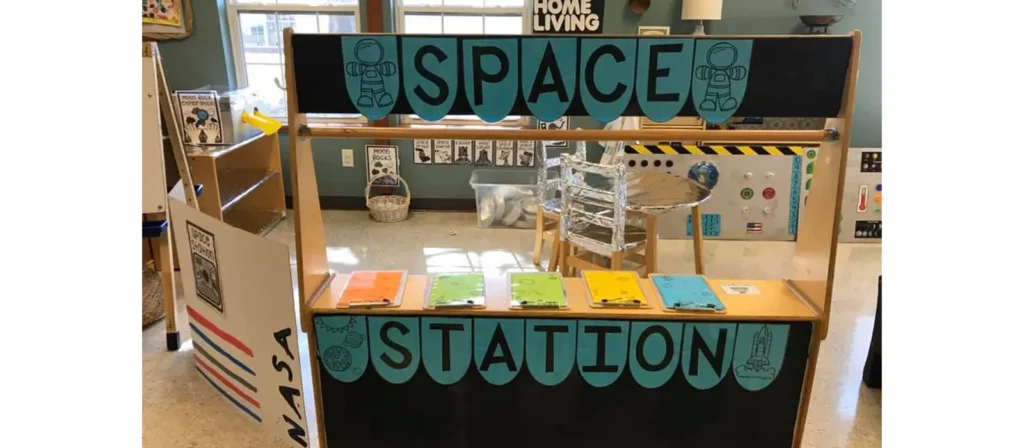
Bildungswert:
Space-themed dramatic play encourages abstract thinking, spatial reasoning, and early scientific inquiry as children explore planets, stars, and missions. It builds vocabulary related to astronomy and space exploration while strengthening collaboration through team-based roles such as astronauts, engineers, and aliens. This type of imaginative play nurtures curiosity, narrative development, and cognitive flexibility.
4. Ideen für Rollenspiele im Lebensmittelgeschäft
- Kunden- und Kassiererrollen: Ein Kind kann den Kunden beim Einkaufen spielen, während ein anderes die Kassiererin ist, die Artikel abkassiert und mit Geld umgeht. So üben Kinder Kommunikation, Mathematik und soziale Kompetenzen.
- Einkaufsliste: Geben Sie Kindern eine Einkaufsliste mit Bildern oder Namen der Artikel, die sie kaufen müssen. Dies ermutigt sie, Artikel zu identifizieren und zu finden, während sie gleichzeitig Lesen und Sortieren üben.
- Regale auffüllen: Kinder können abwechselnd als Ladenmitarbeiter Regale mit Produkten auffüllen. Das lehrt Organisation und Verantwortung.
- Einpacken und Bezahlen: Nach dem „Einkaufen“ können Kinder das Einpacken ihrer Lebensmittel und den Umgang mit einer Registrierkasse üben und so motorische Fähigkeiten entwickeln und Transaktionsvorgänge verstehen.
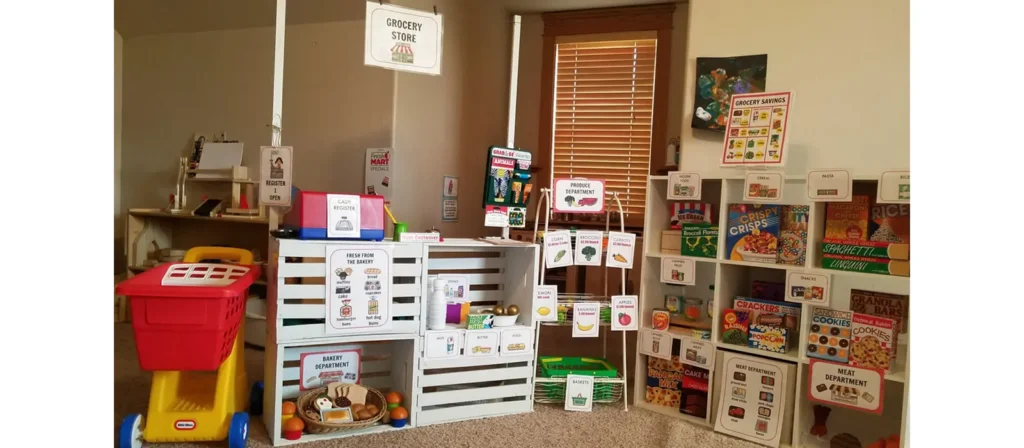
Bildungswert:
A pretend grocery store provides meaningful opportunities for children to practice counting, sorting, and categorizing food items, reinforcing early math and cognitive organization. Functional literacy is supported through reading shopping lists, price labels, and store signage. Children also develop social-emotional competencies such as patience, cooperation, and problem-solving through realistic customer-cashier interactions.
5. Ideen für Rollenspiele im Postamt
- Stellen Sie einen kleinen Tisch als Postschalter auf. Verwenden Sie eine Kiste oder einen Korb als Briefkasten und einen Stuhl hinter dem Schalter für den „Postangestellten“.
- Stellen Sie Umschläge, Postkarten und kleine Pakete bereit. Sie können sogar „Briefe“ aus Papier oder Karton basteln und diese mit verschiedenen Adressen beschriften.
- Verwenden Sie Aufkleber oder Briefmarken, um Porto darzustellen. Kinder können Briefe und Pakete „frankieren“, um ihre Feinmotorik zu üben.
- Fügen Sie Zubehör wie eine Spielkasse, eine Posttasche oder Briefkästen hinzu. Sie können auch ein Spielzeugtelefon verwenden, um Anrufe entgegenzunehmen oder Lieferungen zu tätigen.

Bildungswert:
Post office play encourages emergent writing, print recognition, and meaningful literacy experiences as children create and deliver mail. It develops fine motor control through stamping, sorting, and envelope handling, while fostering language growth through the use of addressing, labeling, and messaging. This setting also introduces the role of postal workers and builds awareness of community helpers and communication systems.
6. Ideen für Rollenspiele mit Superhelden
- Stellen Sie Umhänge, Masken und Schilde bereit, damit sich Kinder als ihre Lieblingssuperhelden verkleiden können. Sie können auch Trainingsübungen wie Hindernisparcours, Geschicklichkeitstests oder Missionen zur Rettung der Welt erstellen. Diese Aktivitäten fördern körperliche Aktivität, Problemlösungsfähigkeiten und Teamwork.
- Richten Sie eine „Mission Control“-Station ein, an der Kinder ihre Superheldenmissionen planen und ihren Fortschritt mithilfe von Walkie-Talkies, Karten und Missionsprotokollen verfolgen können. Dies fördert Teamarbeit, Kommunikation und kreatives Geschichtenerzählen.

Bildungswert:
Superhero role-play supports moral development as children explore ideas of fairness, courage, and helping others. It encourages expressive language and narrative thinking through mission-based storytelling. Gross motor skills are enhanced through active movement, while teamwork and leadership are developed in cooperative “rescue” scenarios.
7. Ideen für Rollenspiele in der Baustelle
- Richten Sie eine Bauzone ein, in der Kinder Häuser, Straßen und andere Bauwerke „bauen“ können. Blöcke oder Spielzeug-Bauwerkzeuge. Kinder können so tun, als wären sie Bauarbeiter, Architekten oder Ingenieure und etwas über Formen, Maße und technische Konzepte lernen.
- Geben Sie Kindern Bauhelme, Werkzeuggürtel und Schutzbrillen. So können sie in die Rolle von Bauarbeitern oder Sicherheitsinspektoren schlüpfen und gleichzeitig Sicherheit und Verantwortungsbewusstsein fördern.

Bildungswert:
Construction-themed play introduces basic engineering principles and spatial awareness as children build and design structures. It strengthens problem-solving and planning abilities while developing gross and fine motor coordination through the use of tools and materials. Social interaction, turn-taking, and cooperation are also reinforced in shared building tasks.
8. Ideen für Rollenspiele im Garten
- Richten Sie einen kleinen Bereich mit Kunstblumen, Töpfen und Kunsterde (aus braunem Stoff oder Papier) ein. Beschriften Sie Bereiche für verschiedene Pflanzenarten, z. B. „Blumen“ oder „Gemüse“. Kinder können so tun, als wären sie Gärtner, pflanzen Blumen, gießen Pflanzen und pflegen ihren Garten. Sie können beim „Anlegen“ ihres Gartens auch etwas über verschiedene Pflanzen lernen.
- Stellen Sie kindgerechte Gartengeräte, Gießkannen und Handschuhe bereit. Sie können auch kleine Körbe oder Säcke zum „Ernten“ der Pflanzen verwenden.
- Wenn der Platz es erlaubt, richten Sie einen kleinen „Markt“ ein, auf dem die Kinder so tun können, als würden sie ihre Pflanzen oder Blumen verkaufen, mit Spielgeld und Preisschildern.
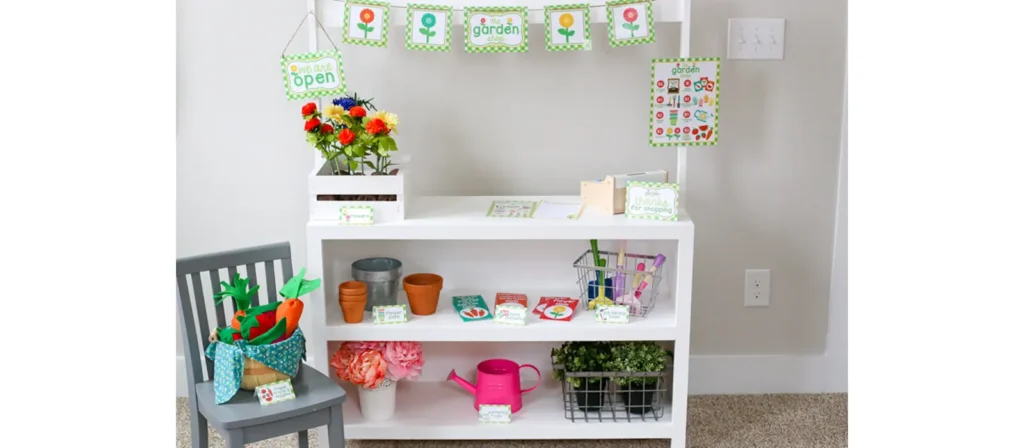
Bildungswert:
Gardening activities nurture responsibility, patience, and an appreciation for nature through role-play focused on planting, watering, and harvesting. Children enhance their understanding of plant life cycles and environmental care while building fine motor skills through digging, pouring, and handling tools. The setting encourages classification, sensory exploration, and early science concepts.
9. Ideen für Rollenspiele im Krankenhaus oder in der Arztpraxis
- Stellen Sie Spielzeug-Stethoskope, Verbandszeug und Arztkittel bereit, damit Kinder so tun können, als wären sie Ärzte oder Krankenschwestern. Sie können sich um kranke Puppen oder Stofftiere kümmern, etwas über medizinische Verfahren lernen und in die Rolle von Patienten oder Pflegekräften schlüpfen.
- Stellen Sie ein Szenario „Notaufnahme im Krankenhaus“ auf, in dem Kinder als Ärzte, Krankenschwestern und Patienten agieren. Dies fördert Empathie, Verantwortungsbewusstsein und ein grundlegendes Verständnis für die Gesundheitsfürsorge.
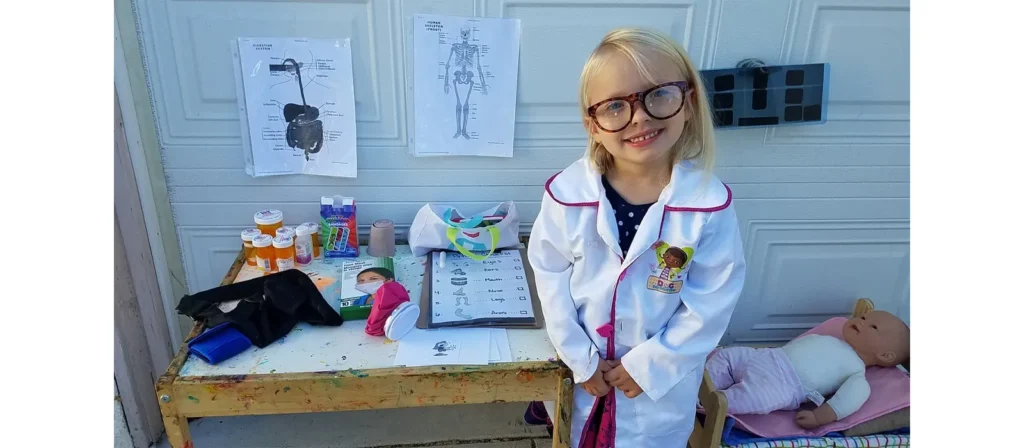
Bildungswert:
Playing doctor allows children to explore health, hygiene, and empathy by caring for patients and learning about the human body. Medical vocabulary is introduced and reinforced, while expressive language is practiced through diagnosis and treatment dialogue. Fine motor control is developed through detailed actions like bandaging or using instruments, and children gain awareness of community health roles.
10. Bauernhof Ideen für Rollenspiele
- Gestalten Sie eine Bauernhofumgebung mit Spielzeugtieren (oder echten Stofftieren) und spielen Sie landwirtschaftliche Geräte wie Gießkannen oder Mistgabeln. Kinder können in die Rolle von Bauern schlüpfen, sich um Tiere kümmern, Feldfrüchte anbauen und einen Bauernhof bewirtschaften.
- Kinder können einen Bauernstand aufbauen und ihre Produkte (Obst, Gemüse, Eier) „verkaufen“. Dies fördert das Lernen über Landwirtschaft, Wirtschaft und Verantwortung.

Bildungswert:
Farm play introduces children to agricultural processes, animal care, and the farm-to-table concept, supporting science and environmental learning. Children develop social-emotional skills like patience, responsibility, and nurturing behaviors. They also expand vocabulary related to farm tools, animals, and produce while engaging in rich role-play scenarios.
11. Ideen für Rollenspiele im Restaurant und Café
- Decken Sie einen Tisch mit Gedecken, Menüs und Notizblöcken für die Aufnahme von Bestellungen.
- Bieten Sie Schürzen und Mützen für Kellner und Köche an und bauen Sie in der Nähe eine Spielküche auf.
- Fügen Sie Schilder wie „Geöffnet“ oder „Geschlossen“ hinzu und geben Sie für Transaktionen Geld vor.
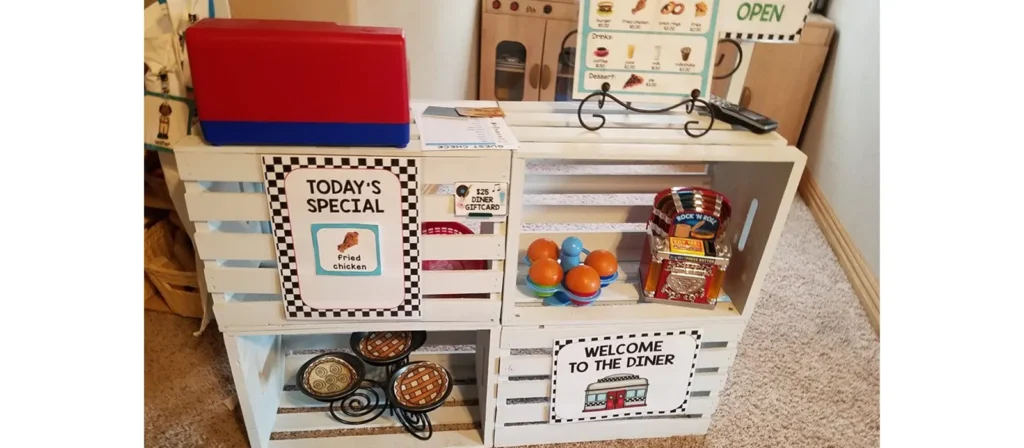
Bildungswert:
Running a pretend restaurant fosters sequencing, memory, and communication as children take orders, serve food, and handle “payments.” It strengthens early math skills through menu prices and reinforces polite social exchanges. Motor skills are enhanced via serving and food preparation, and collaboration is nurtured through shared roles and responsibilities.
12. Ideen für Rollenspiele in der Tierklinik
- Ordnen Sie Plüschtiere als pflegebedürftige „Patienten“ auf Tischen oder Decken an.
- Legen Sie Spielzeugspritzen, Thermometer und Transportboxen für die Untersuchung und Behandlung bei.
- Beschriften Sie Stationen mit „Check-in“, „Operation“ und „Aufwachraum“.
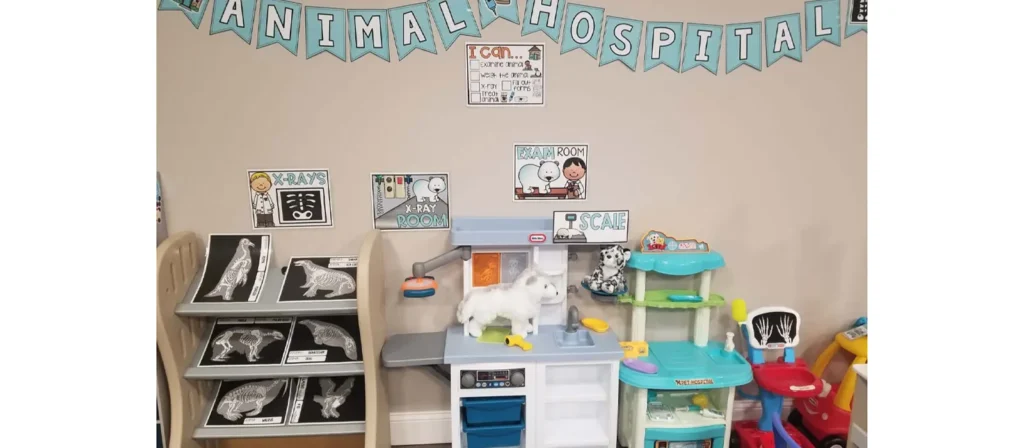
Bildungswert:
This dramatic setting develops empathy, observational skills, and critical thinking as children assess and care for sick or injured animals. Veterinary vocabulary and health concepts are introduced in an age-appropriate way, and fine motor skills are sharpened through the use of medical tools and gentle handling. It encourages role identity and care-based reasoning.
13. Ideen für Rollenspiele in der Feuerwache
- Verwenden Sie rote Papierhüte, einen Karton als Feuerwehrauto und Walkie-Talkies, um eine dramatische Feuerwache aufzubauen.
- Lassen Sie Kinder so tun, als würden sie Notrufe entgegennehmen, zum Brandort eilen und Stofftiere aus imaginären Bränden retten.
- Beim Rollenspiel üben Kinder Teamarbeit, schnelle Entscheidungsfindung und Sicherheitsbewusstsein – alles wichtige Fähigkeiten fürs Leben.
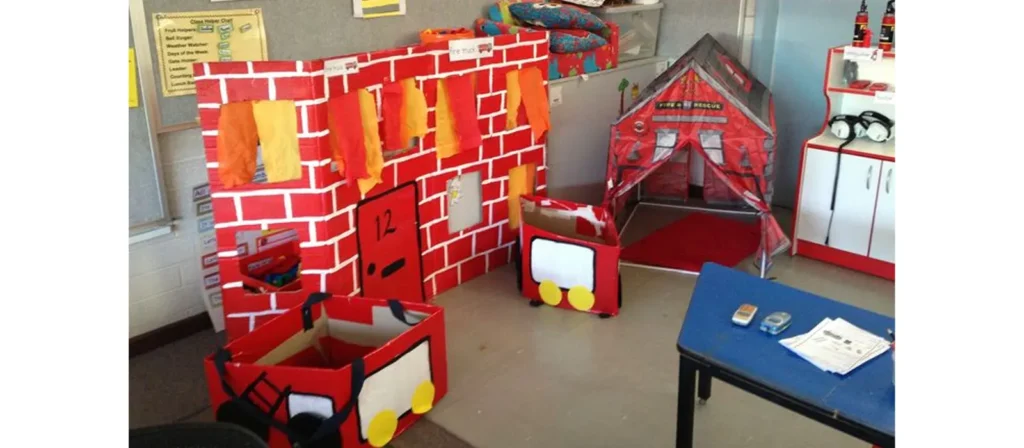
Bildungswert:
Firefighter role-play emphasizes safety education, quick thinking, and physical coordination through emergency response scenarios. It supports understanding of civic duties and introduces vocabulary related to rescue equipment and procedures. Children practice leadership, cooperation, and problem-solving as they take turns acting out heroic rescues and alerts.
14. Ideen für Rollenspiele beim Camping
- Bauen Sie ein Zelt oder eine Deckenburg auf, stellen Sie Taschenlampen auf und machen Sie aus Seidenpapier und Küchenrollen ein Lagerfeuer.
- Lassen Sie die Kinder Rucksäcke packen, am Lagerfeuer Geschichten erzählen oder Marshmallows am Stiel „kochen“.
- Beim Spielen im Camping wird das Geschichtenerzählen gefördert, die Unabhängigkeit gefördert und die Wertschätzung für die Natur gefördert.

Bildungswert:
Camping scenarios foster independence and self-regulation as children simulate setting up tents, cooking, and exploring nature. It promotes storytelling, sequencing, and imaginative thinking while offering opportunities for group collaboration and discussion. Children also gain early exposure to outdoor safety and environmental appreciation.
15. Ideen für dramatische Spiele zur Schatzsuche
- Gestalten Sie Schatzkarten mit alt aussehendem Papier oder Ausdrucken. Verstecken Sie kleine Schätze (Spielzeugmünzen, Edelsteine oder Schmuckstücke) im Zimmer oder auf dem Spielplatz.
- Führen Sie Kinder durch eine Reihe von Rätseln, Bildhinweisen oder Richtungspfeilen, die sie Schritt für Schritt zum versteckten Preis führen.
- Diese Aktivität stärkt das kritische Denken, die Reihenfolge und die Teamarbeit und ermutigt die Kinder gleichzeitig, Anweisungen zu befolgen und neugierig zu bleiben.
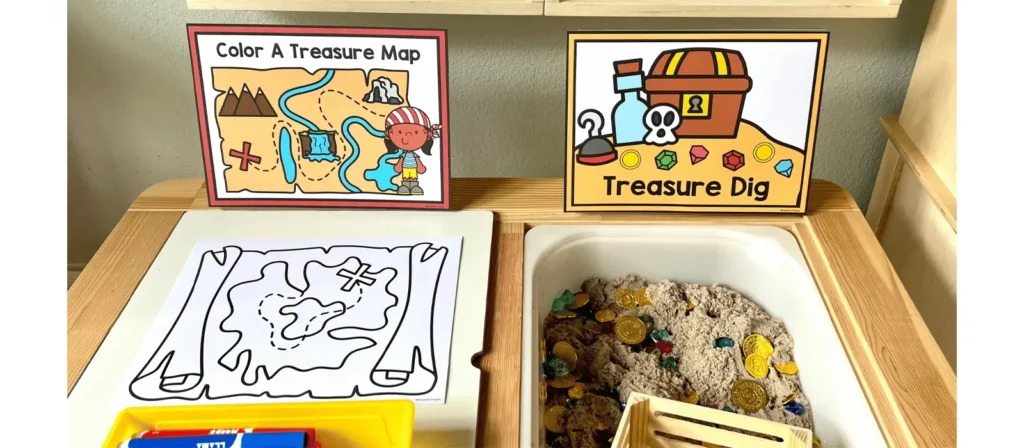
Bildungswert:
A treasure hunt encourages logical reasoning, spatial navigation, and clue interpretation, building foundational problem-solving and critical thinking skills. It strengthens collaboration and communication within teams as children work toward a shared goal. The activity supports perseverance and excitement in goal-directed exploration.
16. Ideen für Rollenspiele mit Piratenschiffen
- Durch Rollenspiele und Abenteuer in einer energiegeladenen Umgebung entwickeln Kinder Kommunikationsfähigkeiten, Führungsqualitäten und die Fähigkeit, gemeinsam Geschichten zu erzählen.
- Bauen Sie aus Pappkartons, Stühlen oder einer Deckenburg ein Piratenschiff. Fügen Sie Papiersegel, ein Pappsteuerrad und Piratenhüte hinzu.
- Lassen Sie Kinder in die Rolle des Kapitäns, Ausgucks oder Navigators schlüpfen. Nutzen Sie Spielzeugteleskope, Karten und Flaggen, um in imaginäre Länder zu segeln.
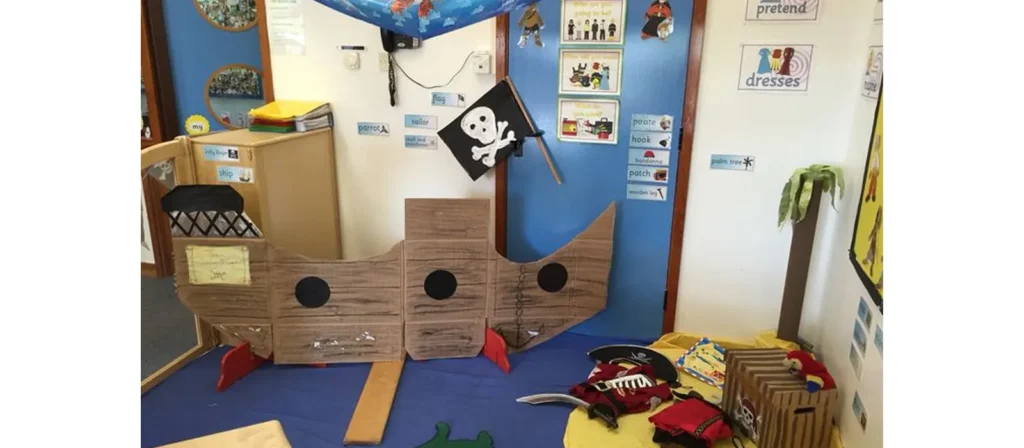
Bildungswert:
Pirate play encourages creative storytelling, leadership, and collaboration as children role-play adventures and navigation. It introduces directionality, map-reading, and symbolic thinking, while also supporting expressive language through dialogue and fantasy. Group dynamics and problem-solving are naturally embedded in shared mission-based play.
17. Ideen für Rollenspiele in der Bibliothek
- Stapeln Sie Bücher in Regalen, stellen Sie bequeme Sitzgelegenheiten oder Lesematten, einen Ausleihschalter und Bibliotheksausweise bereit.
- Kinder übernehmen abwechselnd die Rolle der Bibliothekare, indem sie Bücher ordnen, ausleihen und während einer festgelegten Stuhlkreiszeit Geschichten vorlesen. Andere können in den Büchern stöbern und sie „ausleihen“, um in Ruhe zu lesen.
- Kinder verbessern ihre Leseflüssigkeit, üben ihr Alphabetwissen und lernen etwas über Organisation, Regeln und die Rolle von Bibliotheken in einer Gemeinschaft.

Bildungswert:
Library play fosters early literacy, book handling, and story sequencing as children check out, organize, and read books. It promotes understanding of library systems and roles, enhancing vocabulary and print awareness. Children also build patience and responsibility while respecting rules and taking turns in group reading settings.
18. Ideen für Rollenspiele mit Dinosaurier-Ausgrabungen
- Füllen Sie Sensorikbehälter oder einen Sandkasten mit versteckten Plastikknochen und Fossilien. Stellen Sie Pinsel, Schaufeln und Lupen bereit. Dekorieren Sie den Bereich mit Schildern wie „Willkommen, Paläontologen!“
- Kinder ziehen Forscherwesten und Helme an, graben Fossilien aus und zeichnen ihre Funde in einem Feldtagebuch oder auf einem Schautisch auf.
- Kinder erlernen den wissenschaftlichen Grundwortschatz, verbessern ihre Beobachtungsgabe und erleben den Nervenkitzel der Entdeckung, indem sie echte Paläontologen nachahmen.
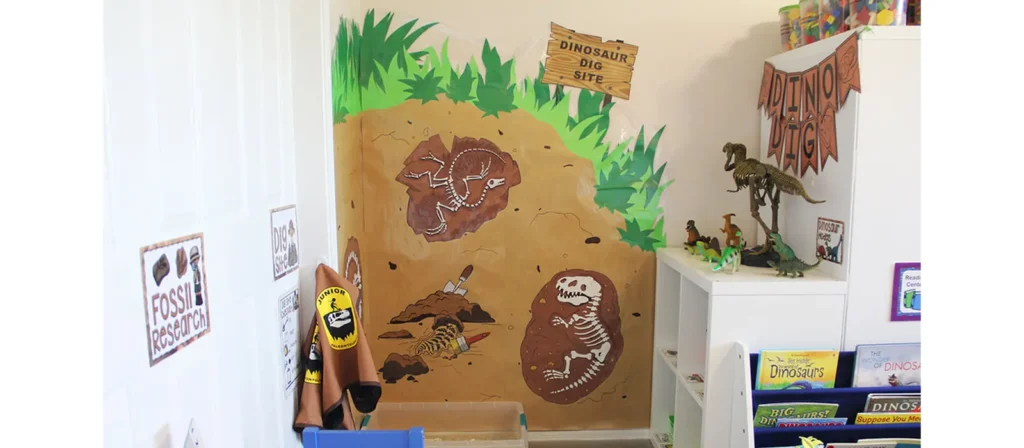
Bildungswert:
Dinosaur-themed excavation introduces children to paleontology, scientific classification, and careful observation. It promotes fine motor development through the use of digging tools and enhances attention to detail during fossil discovery. Children practice documentation and reporting of findings, which supports vocabulary expansion and structured inquiry.
19. Ideen für Rollenspiele mit Zoowärtern
- Ordnen Sie Stofftiere in verschiedenen „Lebensräumen“ an, die mit Schildern gekennzeichnet sind. Stellen Sie Requisiten wie Fütterungsutensilien und Tierpflegeruniformen bereit.
- Kinder fungieren als Tierpfleger, füttern Tiere, reinigen Gehege und geben Führungen.
- Dieses Spiel fördert das Lernen über Tierpflege, Lebensräume und die Bedeutung des Naturschutzes.
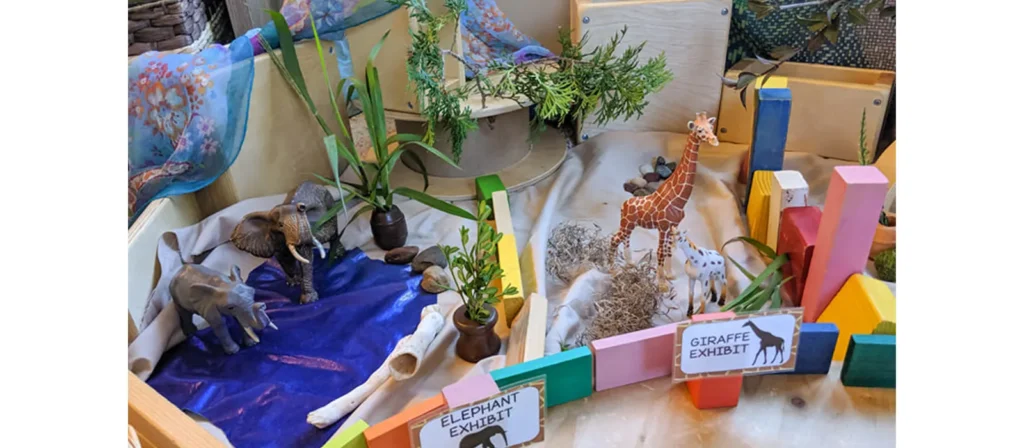
Bildungswert:
Zoo keeper play supports understanding of animals, habitats, and conservation through structured caregiving scenarios. Children expand their biological vocabulary and sense of responsibility while engaging in feeding, cleaning, and habitat creation. The activity also promotes empathy and public speaking through guided “tours” for peers.
20. Ideen für Rollenspiele mit der Wetterstation
- Fügen Sie Karten, Wettersymbole, Thermometer und Mikrofone hinzu.
- Kinder können in die Rolle eines Meteorologen schlüpfen, das Wetter vorhersagen und Prognosen abgeben.
- Dieses Stück verbessert die Redegewandtheit vor Publikum und vermittelt Wissen über Wettermuster und Klima.
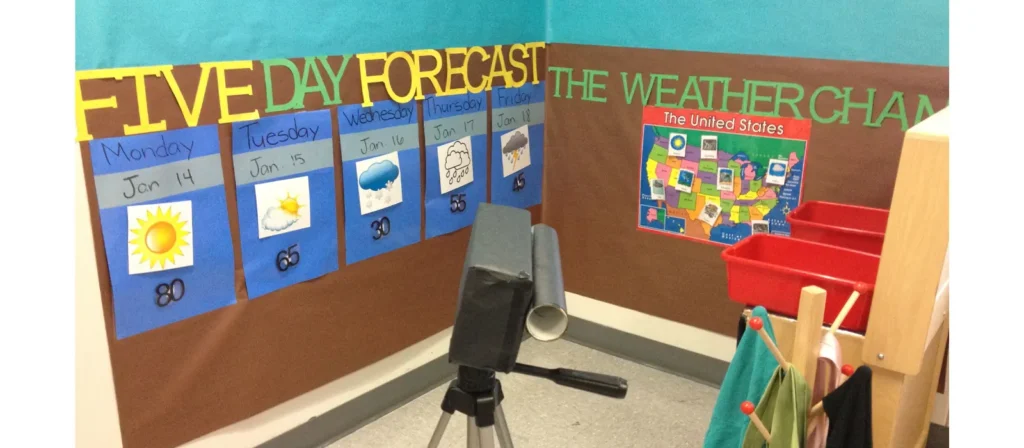
Bildungswert:
Operating a weather station encourages scientific observation, data interpretation, and environmental awareness. Children learn to recognize patterns and make predictions, supporting early inquiry and analytical skills. Language development is enhanced through weather reports and symbolic representations using maps, symbols, and tools.
21. Ideen für Rollenspiele im Nachrichtensender
- Diese Aktivität stärkt auf unterhaltsame und strukturierte Weise das Selbstvertrauen, den Wortschatz und die Fähigkeit, vor Publikum zu sprechen.
- Richten Sie einen Tisch als Nachrichtenpult ein, fügen Sie Mikrofone, Kameras (echte oder künstliche) und Papierskripte hinzu.
- Kinder können in die Rolle von Moderatoren, Reportern oder Kameraleuten schlüpfen und über das Wetter, aktuelle Nachrichten oder Interviews berichten.
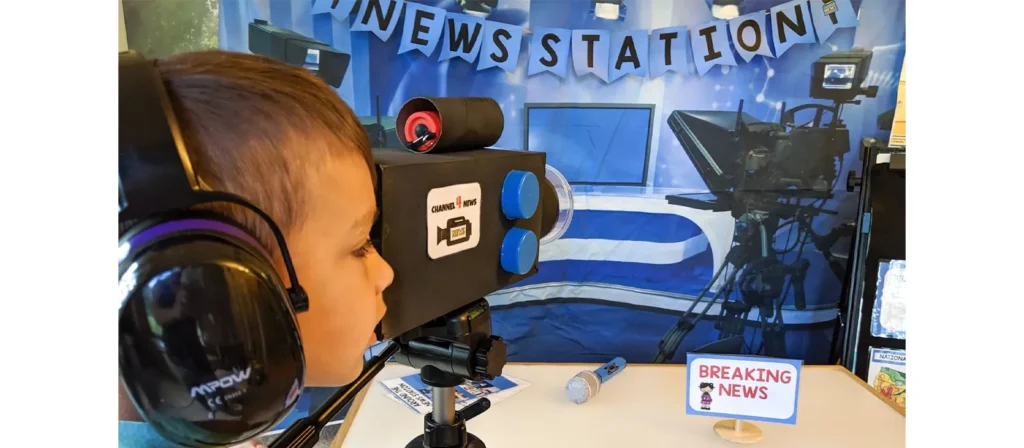
Bildungswert:
Acting as news reporters or anchors strengthens expressive language, narrative sequencing, and confidence in public speaking. Children practice organizing information, summarizing events, and delivering messages. This role-play promotes teamwork and encourages awareness of current events and community happenings.
22. Ideen für dramatische Theaterstücke im Kino
- Ordnen Sie Stuhlreihen an, drucken Sie Kinokarten aus und machen Sie Popcorn oder Snacks.
- Beauftragen Sie Kinder mit der Rolle des Platzanweisers, des Kartenkontrolleurs oder sogar des Darstellers, wenn sie einen „Film“ nachspielen möchten.
- Dies hilft Kindern, Abläufe, Kundeninteraktion und darstellende Künste zu verstehen.
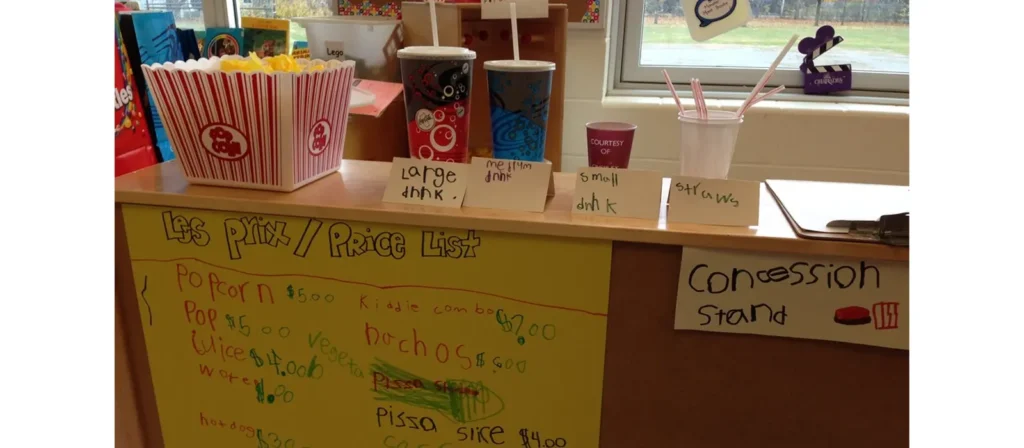
Bildungswert:
Movie theater play enhances sequencing, customer interaction, and dramatic expression through acting, ticketing, and ushering roles. Children practice patience and etiquette as part of an audience, while also developing creative skills in performance and storytelling. Math concepts are reinforced via pricing and role-specific responsibilities.
23. Ideen für Rollenspiele im Königreich
- Bauen Sie Burgen aus Pappe und fügen Sie Kronen, Roben und Zauberstäbe oder Schwerter aus sicheren Materialien hinzu.
- Kinder schlüpfen in die Rolle von Königen, Königinnen, Rittern oder Drachen und erleben geschichtenbasierte Abenteuer und königliche Pflichten.
- Kinder lernen soziale Dynamik, Entscheidungsfindung und Geschichtenerzählen in einer skurrilen Umgebung.
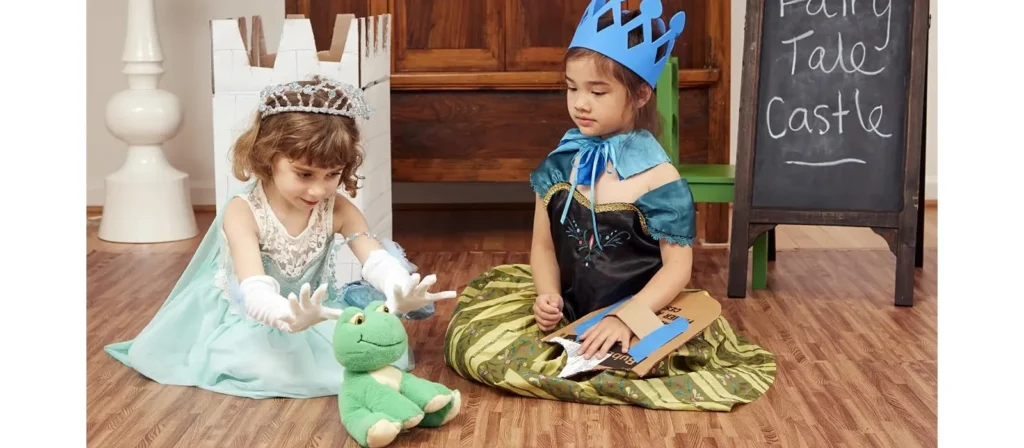
Bildungswert:
Playing with royalty allows children to explore social roles, decision-making, and symbolic rule creation. It fosters rich storytelling, character development, and historical imagination. Social-emotional learning is embedded as children negotiate roles, resolve conflicts, and lead in an imaginative society.
24. Ideen für Rollenspiele am Flughafen
- Ordnen Sie Stühle in Reihen an, um eine Flugzeugkabine nachzubilden, richten Sie einen Check-in-Schalter mit Pässen und Tickets ein und weisen Sie Bereiche wie „Gepäckausgabe“ und „Sicherheitskontrolle“ zu.
- Kinder können in die Rolle von Piloten schlüpfen, die Durchsagen machen, von Flugbegleitern, die Snacks servieren, und von Passagieren schlüpfen, die mit Koffern an Bord gehen und einen Flug zu verschiedenen Zielen imaginieren.
- Dieses Spiel macht Kinder mit Flughafenabläufen, Geographie und globalen Kulturen vertraut und übt dabei das Warten, Abwechseln und Befolgen von Schritten in der richtigen Reihenfolge.
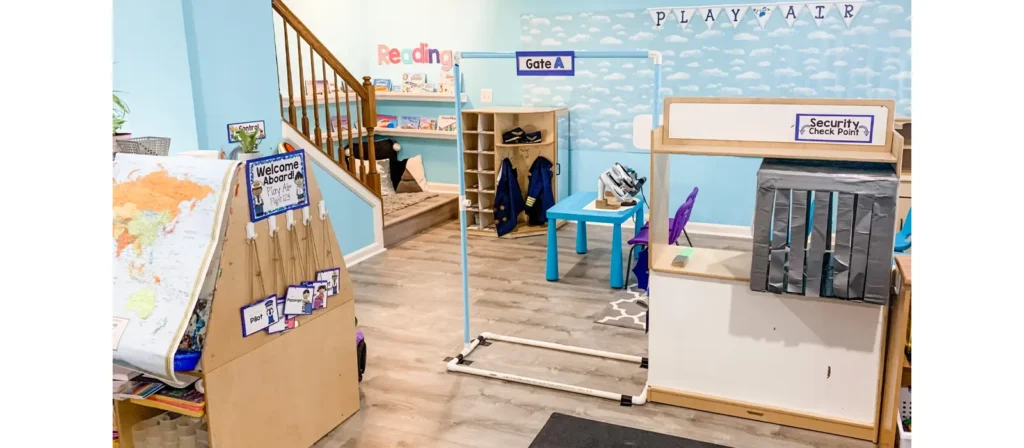
Bildungswert:
Airport play introduces children to travel procedures, sequencing, and cultural geography. It supports role differentiation as they act as pilots, attendants, and passengers. The activity builds patience, order-following, and cooperation, while reinforcing functional literacy through signs, tickets, and boarding procedures.
25. Ideen für Rollenspiele im Wissenschaftslabor
- Use child-sized lab coats, goggles, droppers, beakers, and colorful liquids (like water with food coloring) to set up a pretend science lab.
- Let children role-play as scientists, mixing “chemicals,” conducting safe experiments, and recording results in notebooks.
- Add charts, magnifying glasses, and observation cards to simulate real scientific procedures.
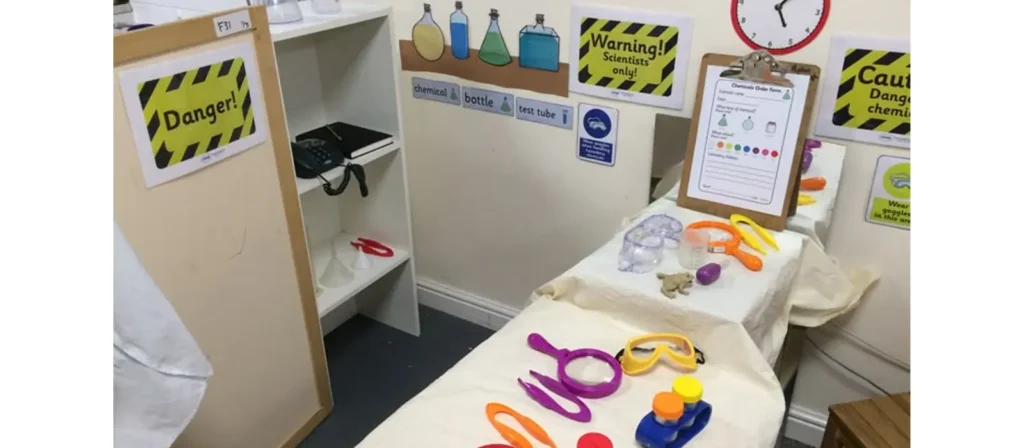
Bildungswert:
Science lab play encourages inquiry, experimentation, and hypothesis formation. Children develop scientific vocabulary and logic as they explore cause-and-effect through safe, pretend experiments. Fine motor skills are refined with tools and mixing tasks, while observation and documentation practices are introduced in age-appropriate ways.
26. Auftritt einer Musikband
- Provide a variety of musical instruments such as tambourines, maracas, drums, xylophones, and keyboards.
- Allow children to take on roles as band members, singers, or conductors, and rehearse together for a performance.
- Add elements like a “stage,” audience seating, and costumes to encourage creative expression and group participation.
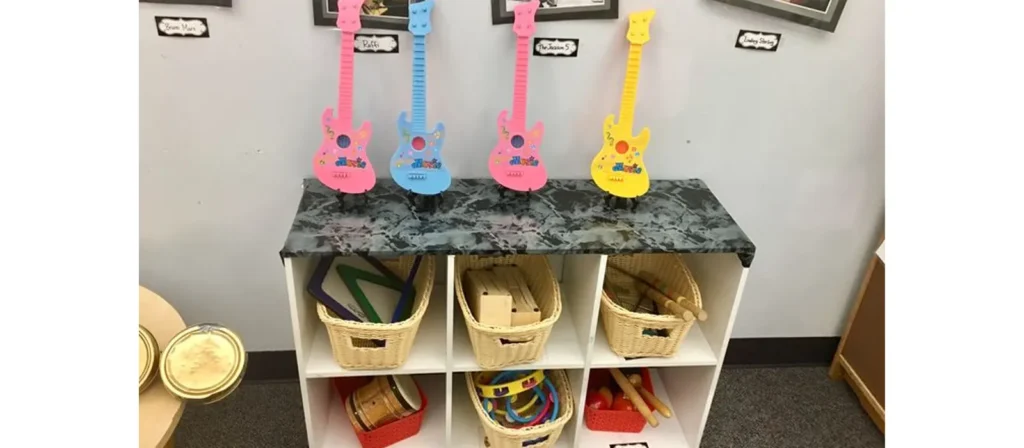
Bildungswert:
Music band play builds rhythm recognition, auditory discrimination, and timing. Children practice coordination and self-expression through instruments and performance. Group music-making encourages cooperation, turn-taking, and shared creativity, while also fostering appreciation for sound, tempo, and cultural diversity.
Creating a Dramatic Play Area
A well-designed dramatic play area serves as the heart of imaginative exploration in any early childhood environment. Whether in a classroom, playroom, or home setting, this space invites children to enter new roles, tell stories, and make sense of the world around them through role-play. Below are essential components and professional tips to help you set up a vibrant, developmentally supportive dramatic play space.
1. Choose a Defined, Flexible Space
Designate a specific area for dramatic play that is separated from quieter activities like reading or puzzles. This helps children mentally shift into “imaginative mode.” Use low shelves, rugs, or curtains to define boundaries. The space should be flexible enough to accommodate rotating themes like kitchens, doctor’s offices, or space stations.
2. Provide Open-Ended Props and Realistic Materials
Stock the area with a mix of open-ended materials (like cardboard boxes, scarves, and wooden blocks) and realistic props. Items don’t have to be expensive—many can come from recycling bins or donation drives. Choose materials that can be repurposed for multiple themes to spark creativity.



3. Include Literacy and Numeracy Elements
Enhance the learning potential of your dramatic play area by embedding opportunities for reading, writing, and counting. Examples include:
- Menus, shopping lists, appointment books
- Price tags, clocks, and play money
- Maps, signs, tickets, and labels
These items help children naturally engage with academic concepts during pretend play.
4. Rotate Themes and Materials Regularly
To keep interest high and expand children’s learning experiences, change the dramatic play theme every few weeks. Involve children in deciding what the next theme should be—it empowers them and increases engagement. Some common rotations include:
- Grocery Store
- Animal Hospital
- Camping Adventure
- Weather Station
- Pirate Ship
5. Support Inclusive and Culturally Relevant Play
Ensure the space reflects a variety of cultures, family types, and community roles. Include diverse costumes, dolls with different skin tones, and signage in multiple languages. Dramatic play should provide opportunities for every child to see themselves and others positively represented.
6. Prioritize Safety and Cleanliness
All props and furniture should be age-appropriate, non-toxic, and free of sharp edges. Regularly check for wear and tear and sanitize frequently touched items. Use soft furnishings, rounded corners, and ensure easy access to prevent accidents and promote independence.
Senden Sie uns eine Nachricht, wenn Sie Fragen haben oder ein Angebot anfordern möchten. Unsere Experten antworten Ihnen innerhalb von 48 Stunden und helfen Ihnen bei der Auswahl des richtigen Produkts.
Herausforderungen bei Ideen für Rollenspiele meistern

1. Mangel an Ressourcen oder Materialien
One of the most common challenges in dramatic play is the lack of materials to support the activity fully. Whether it’s missing props, costumes, or play items, children might struggle to engage in specific scenarios without the right tools.
Lösung: Get creative with the resources you already have. Household items like cardboard boxes can turn into stoves, refrigerators, or cars. Old clothes can be repurposed as costumes, and simple toys like wooden spoons or plastic containers can be used for cooking or grocery shopping. Additionally, encourage children to create their materials. For example, they can make their menus, price tags, or even flowers out of paper or fabric. This solves the material issue and fosters creativity and problem-solving skills.
2. Kurze Aufmerksamkeitsspanne
Kleine Kinder haben oft Schwierigkeiten, sich über längere Zeit auf ein Rollenspiel einzulassen. Sie wechseln häufig die Rollen oder verlieren das Interesse an der Aktivität ganz.
LösungHalten Sie die Spielsitzungen kurz und dynamisch. Teilen Sie die Aktivitäten in überschaubare Abschnitte auf, damit die Kinder reibungslos zwischen Rollen oder Szenarien wechseln können. Lassen Sie sie beispielsweise nicht 20 Minuten lang Kassierer spielen, sondern wechseln Sie alle paar Minuten die Rolle. Das hält das Spiel frisch und spannend. Sie können auch während des Spiels neue Elemente einführen (wie einen Überraschungskunden oder eine „Sonderlieferung“), um das Interesse zu wecken und die Aufmerksamkeit aufrechtzuerhalten.
3. Konflikte unter Kindern
Da Rollenspiele oft gemeinsame Räume und Rollen beinhalten, können Konflikte zwischen Kindern entstehen. Meinungsverschiedenheiten darüber, wer welche Rolle spielt oder wie das Spiel ablaufen soll, können den Spielfluss stören.
LösungErmutigen Sie Kinder zur Zusammenarbeit und Rollenverhandlung. Klare Grundregeln, wie z. B. Abwechseln oder das Teilen von Requisiten, können ebenfalls Konflikten vorbeugen. Bei Streitigkeiten können Sie Kinder durch Problemlösungsstrategien führen, indem Sie sie beispielsweise fragen, wie sie das Problem gemeinsam lösen können, oder ihnen eine neue Rolle vorschlagen. Sozial-emotionales Lernen ist der Kern des Rollenspiels. Daher ist es wichtig, diese Momente zu nutzen, um Empathie, Respekt und Teamwork zu vermitteln.
4. Eingeschränkte soziale Interaktionen
Obwohl Rollenspiele soziale Kompetenzen fördern, fällt es manchen Kindern oft schwer, bei diesen Aktivitäten mit Gleichaltrigen zu interagieren. Sie fühlen sich möglicherweise schüchtern, eingeschüchtert oder unsicher, wie sie mit anderen umgehen sollen.

Lösung: Set up the dramatic play scenario to naturally encourage group participation. For instance, instead of having one cashier and one customer, set up a larger grocery store or restaurant where multiple children can take on different roles simultaneously (e.g., cashier, customer, stocker, manager). This encourages children to interact in a less intimidating environment. Additionally, scaffolding the play by suggesting dialogue or prompts can help children who are hesitant to speak or take the lead.
5. Schwierigkeiten mit Rollenspielen in
Kinder finden es möglicherweise schwierig, in Rollenspielen bestimmte Rollen zu übernehmen. Sie wissen möglicherweise nicht, wie sie sich als Arzt, Koch oder Lehrer verhalten sollen, oder sind sich ihrer Verantwortung im Spielszenario unsicher.
Lösung: Provide simple role cards or scripts outlining each role. For example, a “doctor’s role card” might include phrases like “How are you feeling today?” or “Let me check your temperature,” which will guide children in their role-playing. Modeling behaviors and providing real-life examples, such as pretending to be a customer at a restaurant or a teacher in a classroom, can also help children become characters. Creating a safe environment where they feel comfortable experimenting with different roles without fear of making mistakes is essential.
6. Überwältigt von der Auswahl
Rollenspiele bieten oft zahlreiche Möglichkeiten, die Kinder manchmal überfordern können. Sie wissen möglicherweise nicht, wo sie anfangen sollen, oder haben Schwierigkeiten, zwischen vielen Rollen und Szenarien zu wählen.
LösungSchränken Sie die Möglichkeiten ein und schaffen Sie strukturiertere Spielsituationen. Wenn Sie beispielsweise ein Restaurantthema haben, können Sie Rollen wie „Koch“, „Kellner“ oder „Kunde“ vorschlagen, um das Spiel zu fokussieren. Sie können Kinder auch Schritt für Schritt an neue Szenarien heranführen. Anstatt ihnen eine große „Baustelle“ zu präsentieren, könnten Sie sich zunächst auf den Bau einer bestimmten Struktur wie eines Hauses oder einer Brücke konzentrieren und das Spiel dann erweitern, wenn die Kinder sich sicherer fühlen.
7. Übersimulation oder Untersimulation
Manche Kinder empfinden die Umgebung möglicherweise als zu hektisch, überwältigend, still und unterstimulierend. Der Reizpegel kann dazu führen, dass Rollenspiele weniger Spaß machen oder weniger produktiv sind.
Lösung: Sorgen Sie für ein ausgewogenes Reizniveau im Spielbereich. Ist es zu chaotisch, versuchen Sie, die Umgebung zu vereinfachen, indem Sie die Anzahl der Requisiten reduzieren oder Ablenkungen minimieren. Ist der Raum zu ruhig, fügen Sie neue Elemente wie Hintergrundmusik, neue Szenarien oder mehr Requisiten hinzu, um die Kinder zu beschäftigen. Wichtig ist, dass sich der Raum gut anfühlt: nicht überwältigend, aber anregend genug, um Fantasie und Lernen zu fördern.
8. Verpasste Lernmöglichkeiten
Ohne die Anleitung von Erwachsenen können Kinder die Lernmöglichkeiten, die Rollenspiele bieten, nicht immer optimal nutzen. Sie sind möglicherweise so in den Spaß vertieft, dass sie wichtige Fähigkeiten wie Zählen, Kommunizieren oder das Befolgen von Anweisungen nicht üben können.
Lösung: Als Lehrer oder Spielleiter leiten Sie das Spiel behutsam, ohne es zu dominieren. Stellen Sie offene Fragen wie „Wie viele Äpfel möchtest du kaufen?“ oder „Was machst du als Erstes, wenn du in der Arztpraxis ankommst?“. Das regt die Kinder zum kritischen Denken an und stärkt die Lernziele. Sie können auch pädagogische Hilfsmittel (wie Spielgeld oder Rezeptkarten) einsetzen, die die Kinder während des Spiels dazu anregen, Lese-, Rechen- und Problemlösungsfähigkeiten zu entwickeln.
9. Inkonsistente Teilnahme
In einer Gruppenumgebung möchte möglicherweise nicht jedes Kind an Rollenspielen teilnehmen, und manche sträuben sich möglicherweise dagegen, insbesondere wenn sie mit dem Thema nicht vertraut sind oder sich von der Aktivität abgekoppelt fühlen.
Lösung: Ermutigen Sie zurückhaltende Kinder, indem Sie vertrautere Elemente einführen. Wenn das Thema beispielsweise „Restaurant“ ist, ein Kind sich aber unsicher ist, können Sie mit etwas beginnen, das ihm vertraut ist, wie „Hausmannskost“, und es langsam an komplexere Rollenspiele heranführen. Schaffen Sie eine einladende Atmosphäre, in der sich alle Kinder willkommen und wohl fühlen, auch wenn es zunächst nur eine kurze Vorführung oder kleinere Gruppen erfordert.
Frequently Asked Questions About Dramatic Play
- What is another word for dramatic play?
Dramatic play is often referred to as pretend play, imaginative play, or role play. These terms are used interchangeably to describe activities where children act out scenarios using their imagination and social understanding. - At what age should children start engaging in dramatic play?
Children as young as 18 months begin to imitate simple actions, like pretending to talk on the phone. Around age 2 to 3, they enter the symbolic play stage, where they start creating structured pretend scenarios. By preschool age (3–5 years), dramatic play becomes more complex, incorporating storytelling, collaboration, and themed environments. - What are some examples of dramatic play settings?
Common dramatic play settings include pretend kitchens, grocery stores, doctor’s offices, post offices, restaurants, science labs, construction zones, music stages, and more. These scenarios mimic real-life environments or imaginative worlds (like pirate ships or royal kingdoms) and provide opportunities for diverse developmental benefits. - Can dramatic play be integrated into academic learning goals?
Absolutely. Dramatic play supports multiple academic domains: math (through pricing, counting, measuring), science (via experimentation, observation), and literacy (through signs, lists, role-based communication). With intentional planning, educators can align play scenarios with curriculum standards while keeping learning playful and child-centered. - Is dramatic play still valuable for older children (ages 6+)?
Yes. While the style of play becomes more narrative and structured, older children still benefit from role-play in the form of skits, creative writing, mock interviews, or historical reenactments. It continues to support empathy, communication, perspective-taking, and even leadership skills, especially when integrated into project-based learning. - How do children’s roles evolve during dramatic play?
Younger children often imitate familiar routines, while older children create more complex narratives, assign roles, and develop rules or scripts. Role flexibility also increases, showing cognitive growth and social maturity.
Fazit: Die Kraft der Vorstellungskraft entfesseln
Rollenspiele sind ein wirksames Mittel, um die Kreativität, das Lernen und die persönliche Entwicklung von Kindern zu fördern. Ob Gärtner, Arzt oder Ladenbesitzer – diese fantasievollen Rollen machen Spaß und fördern wichtige Entwicklungskompetenzen. Durch Rollenspiele entdecken Kinder neue Konzepte, üben Problemlösungen und nehmen an sinnvollen sozialen Interaktionen teil.
Fantasie macht nicht nur Spaß – sie ist der Schlüssel zur Entwicklung von Empathie, Selbstvertrauen und Problemlösungskompetenz. Indem wir diese Kreativität fördern, helfen wir Kindern, sich zu vielseitigen, nachdenklichen und neugierigen Persönlichkeiten zu entwickeln, die bereit sind, selbstbewusst und mitfühlend durch die Welt zu gehen.




